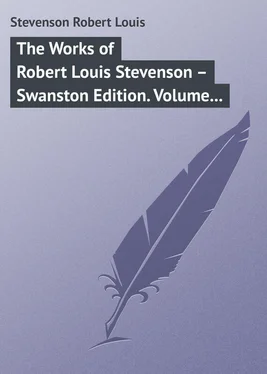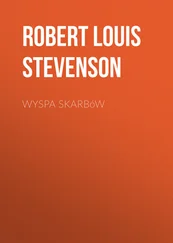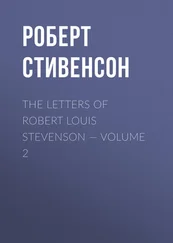Robert Stevenson - The Works of Robert Louis Stevenson – Swanston Edition. Volume 20
Здесь есть возможность читать онлайн «Robert Stevenson - The Works of Robert Louis Stevenson – Swanston Edition. Volume 20» — ознакомительный отрывок электронной книги совершенно бесплатно, а после прочтения отрывка купить полную версию. В некоторых случаях можно слушать аудио, скачать через торрент в формате fb2 и присутствует краткое содержание. Жанр: foreign_prose, на английском языке. Описание произведения, (предисловие) а так же отзывы посетителей доступны на портале библиотеки ЛибКат.
- Название:The Works of Robert Louis Stevenson – Swanston Edition. Volume 20
- Автор:
- Жанр:
- Год:неизвестен
- ISBN:нет данных
- Рейтинг книги:4 / 5. Голосов: 1
-
Избранное:Добавить в избранное
- Отзывы:
-
Ваша оценка:
- 80
- 1
- 2
- 3
- 4
- 5
The Works of Robert Louis Stevenson – Swanston Edition. Volume 20: краткое содержание, описание и аннотация
Предлагаем к чтению аннотацию, описание, краткое содержание или предисловие (зависит от того, что написал сам автор книги «The Works of Robert Louis Stevenson – Swanston Edition. Volume 20»). Если вы не нашли необходимую информацию о книге — напишите в комментариях, мы постараемся отыскать её.
The Works of Robert Louis Stevenson – Swanston Edition. Volume 20 — читать онлайн ознакомительный отрывок
Ниже представлен текст книги, разбитый по страницам. Система сохранения места последней прочитанной страницы, позволяет с удобством читать онлайн бесплатно книгу «The Works of Robert Louis Stevenson – Swanston Edition. Volume 20», без необходимости каждый раз заново искать на чём Вы остановились. Поставьте закладку, и сможете в любой момент перейти на страницу, на которой закончили чтение.
Интервал:
Закладка:
“Why, yes, sir,” said I; “and I must say I am very well entertained.”
“I envy you,” said he. “I have jogged many miles of it myself when I was younger. My youth lies buried about here under every heather-bush, like the soul of the licentiate Lucius. But you should have a guide. The pleasure of this country is much in the legends, which grow as plentiful as blackberries.” And directing my attention to a little fragment of a broken wall no greater than a tombstone, he told me, for an example, a story of its earlier inhabitants. Years after it chanced that I was one day diverting myself with a Waverley Novel, when what should I come upon but the identical narrative of my green-coated gentleman upon the moors! In a moment the scene, the tones of his voice, his northern accent, and the very aspect of the earth and sky and temperature of the weather, flashed back into my mind with the reality of dreams. The unknown in the green coat had been the Great Unknown! I had met Scott; I had heard a story from his lips; I should have been able to write, to claim acquaintance, to tell him that his legend still tingled in my ears. But the discovery came too late, and the great man had already succumbed under the load of his honours and misfortunes.
Presently, after giving us a cigar apiece, Scott bade us farewell and disappeared with his daughter over the hills. And when I applied to Sim for information, his answer of “The Shirra, man! A’body kens the Shirra!” told me, unfortunately, nothing.
A more considerable adventure falls to be related. We were now near the border. We had travelled for long upon the track beaten and browsed by a million herds, our predecessors, and had seen no vestige of that traffic which had created it. It was early in the morning when we at last perceived, drawing near to the drove-road, but still at a distance of about half a league, a second caravan, similar to but larger than our own. The liveliest excitement was at once exhibited by both my comrades. They climbed hillocks, they studied the approaching drove from under their hand, they consulted each other with an appearance of alarm that seemed to me extraordinary. I had learned by this time that their stand-off manners implied, at least, no active enmity; and I made bold to ask them what was wrong.
“Bad yins,” was Sim’s emphatic answer.
All day the dogs were kept unsparingly on the alert, and the drove pushed forward at a very unusual and seemingly unwelcome speed. All day Sim and Candlish, with a more than ordinary expenditure both of snuff and of words, continued to debate the position. It seems that they had recognised two of our neighbours on the road – one Faa, and another by the name of Gillies. Whether there was an old feud between them still unsettled I could never learn; but Sim and Candlish were prepared for every degree of fraud or violence at their hands. Candlish repeatedly congratulated himself on having left “the watch at home with the mistress”; and Sim perpetually brandished his cudgel, and cursed his ill-fortune that it should be sprung.
“I wilna care a damn to gie the daashed scoon’rel a fair clout wi’ it,” he said. “The daashed thing micht come sindry in ma hand.”
“Well, gentlemen,” said I, “suppose they do come on, I think we can give a very good account of them.” And I made my piece of holly, Ronald’s gift, the value of which I now appreciated, sing about my head.
“Ay, man? Are ye stench?” inquired Sim, with a gleam of approval in his wooden countenance.
The same evening, somewhat wearied with our day-long expedition, we encamped on a little verdant mound, from the midst of which there welled a spring of clear water scarce great enough to wash the hands in. We had made our meal and lain down, but were not yet asleep, when a growl from one of the collies set us on the alert. All three sat up, and on a second impulse all lay down again, but now with our cudgels ready. A man must be an alien and an outlaw, an old soldier and a young man in the bargain, to take adventure easily. With no idea as to the rights of the quarrel or the probable consequences of the encounter, I was as ready to take part with my two drovers as ever to fall in line on the morning of a battle. Presently there leaped three men out of the heather; we had scarce time to get to our feet before we were assailed; and in a moment each one of us was engaged with an adversary whom the deepening twilight scarce permitted him to see. How the battle sped in other quarters I am in no position to describe. The rogue that fell to my share was exceedingly agile and expert with his weapon; had and held me at a disadvantage from the first assault; forced me to give ground continually, and at last, in mere self-defence, to let him have the point. It struck him in the throat, and he went down like a nine-pin and moved no more.
It seemed this was the signal for the engagement to be discontinued. The other combatants separated at once; our foes were suffered, without molestation, to lift up and bear away their fallen comrade; so that I perceived this sort of war to be not wholly without laws of chivalry, and perhaps rather to partake of the character of a tournament than of a battle à outrance . There was no doubt, at least, that I was supposed to have pushed the affair too seriously. Our friends the enemy removed their wounded companion with undisguised consternation; and they were no sooner over the top of the brae than Sim and Candlish roused up their wearied drove and set forth on a night march.
“I’m thinking Faa’s unco bad,” said the one.
“Ay,” said the other, “he lookit dooms gash.”
“He did that,” said the first.
And their weary silence fell upon them again.
Presently Sim turned to me. “Ye’re unco ready with the stick,” said he.
“Too ready, I’m afraid,” said I. “I am afraid Mr. Faa (if that be his name) has got his gruel.”
“Weel, I wouldna wonder,” replied Sim.
“And what is likely to happen?” I inquired.
“Aweel,” said Sim, snuffing profoundly, “if I were to offer an opeenion, it would not be conscientious. For the plain fac’ is, Mr. St. Ivy, that I div not ken. We have had crackit heids – and rowth of them – ere now; and we have had a broken leg, or maybe twa; and the like of that we drover bodies make a kind of a practice like to keep among oursel’s. But a corp we have none of us ever had to deal with, and I could set na leemit to what Gillies micht consider proper in the affair. Forbye that, he would be in raither a hobble himsel’ if he was to gang hame wantin’ Faa. Folk are awfu’ throng with their questions, and parteecularly when they’re no’ wantit.”
“That’s a fac’,” said Candlish.
I considered this prospect ruefully; and then making the best of it, “Upon all which accounts,” said I, “the best will be to get across the Border and there separate. If you are troubled, you can very truly put the blame upon your late companion; and if I am pursued, I must just try to keep out of the way.”
“Mr. St. Ivy,” said Sim, with something resembling enthusiasm, “no’ a word mair! I have met in wi’ mony kinds o’ gentry ere now; I hae seen o’ them that was the tae thing, and I hae seen o’ them that was the tither; but the wale of a gentleman like you I have no’ sae very frequently seen the bate of.”
Our night march was accordingly pursued with unremitting diligence. The stars paled, the east whitened, and we were still, both dogs and men, toiling after the wearied cattle. Again and again Sim and Candlish lamented the necessity: it was “fair ruin on the bestial,” they declared; but the thought of a judge and a scaffold hunted them ever forward. I myself was not so much to be pitied. All that night, and during the whole of the little that remained before us of our conjunct journey, I enjoyed a new pleasure, the reward of my prowess, in the now loosened tongue of Mr. Sim. Candlish was still obdurately taciturn: it was the man’s nature; but Sim, having finally appraised and approved me, displayed without reticence a rather garrulous habit of mind and a pretty talent for narration. The pair were old and close companions, co-existing in these endless moors in a brotherhood of silence such as I have heard attributed to the trappers of the West. It seems absurd to mention love in connection with so ugly and snuffy a couple; at least, their trust was absolute; and they entertained a surprising admiration for each other’s qualities; Candlish exclaiming that Sim was “grand company!” and Sim frequently assuring me in an aside that for “a rale auld stench bitch there was na the bate of Candlish in braid Scotland.” The two dogs appeared to be entirely included in this family compact, and I remarked that their exploits and traits of character were constantly and minutely observed by the two masters. Dog-stories particularly abounded with them; and not only the dogs of the present but those of the past contributed their quota. “But that was naething,” Sim would begin: “there was a herd in Manar, they ca’d him Tweedie – ye’ll mind Tweedie, Can’lish?” “Fine, that!” said Candlish. “Aweel, Tweedie had a dog – ” The story I have forgotten; I dare say it was dull, and I suspect it was not true; but indeed my travels with the drovers had rendered me indulgent, and perhaps even credulous, in the matter of dog-stories. Beautiful, indefatigable beings! as I saw them at the end of a long day’s journey frisking, barking, bounding, striking attitudes, slanting a bushy tail, manifestly playing to the spectator’s eye, manifestly rejoicing in their grace and beauty – and turned to observe Sim and Candlish unornamentally plodding in the rear with the plaids about their bowed shoulders and the drop at their snuffy nose – I thought I would rather claim kinship with the dogs than with the men! My sympathy was unreturned; in their eyes I was a creature light as air; and they would scarce spare me the time for a perfunctory caress or perhaps a hasty lap of the wet tongue, ere they were back again in sedulous attendance on those dingy deities, their masters – and their masters, as like as not, damning their stupidity.
Читать дальшеИнтервал:
Закладка:
Похожие книги на «The Works of Robert Louis Stevenson – Swanston Edition. Volume 20»
Представляем Вашему вниманию похожие книги на «The Works of Robert Louis Stevenson – Swanston Edition. Volume 20» списком для выбора. Мы отобрали схожую по названию и смыслу литературу в надежде предоставить читателям больше вариантов отыскать новые, интересные, ещё непрочитанные произведения.
Обсуждение, отзывы о книге «The Works of Robert Louis Stevenson – Swanston Edition. Volume 20» и просто собственные мнения читателей. Оставьте ваши комментарии, напишите, что Вы думаете о произведении, его смысле или главных героях. Укажите что конкретно понравилось, а что нет, и почему Вы так считаете.










